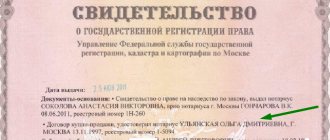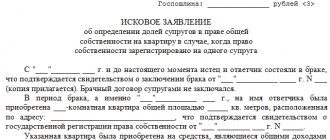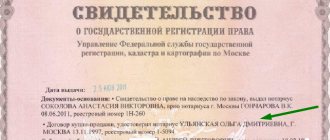Private property is the legal right of specific legal entities or individuals to real estate located in the housing sector. The laws of the Russian Federation do not limit how much of it each citizen can own, what size it is and what its value is.
The main condition is that property in the country must be registered with the Office of the Federal Registration Service.
The type of ownership is one of the foundations of the world economy. This concept is used as property or relationships that arise regarding ownership, appropriation and use.
There are 2 main types of apartment ownership:
- Municipal or state. The owners are the state, represented by departments and committees for the management of state property, and local governments.
- Private. Real estate is owned by individuals or families. Divided into several subspecies:
- individual;
- collective (general);
- share;
- general share;
- general joint.
Types of private property
Let us consider in more detail such types as individual and general:
- Individual. It is characterized by the fact that an individual fully owns his property. This form provides for the ownership of an apartment by one person. This is possible if he is the only one registered in the housing or the other residents have renounced their rights to this property.
- Common property is the ownership of property by several citizens. According to the law, this form is divided into joint and shared.
Joint
This form of real estate ownership does not provide for dividing it into parts. The responsibilities and rights associated with housing located in this type of ownership lie with all owners simultaneously. Regardless of how many owners and what size of the apartment, if one of them wants to donate, sell or abandon the property, the decision is made by all owners.
When buying an apartment that has several owners, the purchase and sale agreement must be concluded simultaneously with all of them.
Share
With this form, the specific share of the apartment of each owner is determined. Housing must be divided into equal parts, but there are exceptions. For example, by law or contract, shares may be determined unevenly, taking into account what contribution was made during the purchase or how many improvements were made by one or another owner. All residents who have a share manage the property, make repairs, redevelopment, by mutual agreement.
If one of the owners decides to sell, donate or abandon his part, he can do this without waiting for a positive response from other property owners. However, they have a pre-emptive right to purchase part of the apartment if it is sold to an outsider.
Own
This type occurs when housing is purchased by spouses using common funds or after its privatization. Of course, each family member has his share, but these parts are not specifically defined and are considered absolutely equal. The husband and wife dispose of property by mutual agreement. In general, everything that the spouses acquired during the marriage is considered common, except for things for personal use, and this does not depend on the fact that one worked and the other took care of the house and looked after the children.
When entering into a marriage, a marriage contract can be drawn up between people; it can stipulate what property or part of it will belong specifically to each person. They can also enter into other agreements between themselves that are permitted by law.
Each spouse can enter into agreements with third parties such as: lifelong maintenance, purchase and sale, exchange, donation, regarding the part of the housing they own, only after its allocation or determination of the procedure for using the property. You can include a share in your will without separating it or dividing it.
Property rights between family members continue to apply after the termination of the marriage. Unless otherwise agreed in the prenuptial agreement or agreements concluded between the spouses during the marriage. Property that belongs to the family can be divided among its members by mutual agreement; if this is not reached, then the dispute must be resolved in court.
Individual (personal, full) ownership of the apartment
This is the case when the apartment is solely owned by one person. He also manages it. It is indicated in the Title or in the Unified State Register of Real Estate for the apartment.
True, this does not exclude the existence of other rights (for example, the right to use) by third parties (members of his family, for example). Such characters have nothing to do with property and do not affect the disposal of real estate, but actually create an encumbrance (in the form of their right of residence) when selling an apartment.
In addition, if the only owner indicated in the Title/Extract of the Unified State Register is married, then the apartment can also be owned by his spouse under the right of “joint property of spouses.”
!!! Online order Extracts from the Unified State Register and other SERVICES for purchasing an apartment - HERE.
Who are “third parties” in real estate transactions? What rights do they have? Which of them can challenge the completed transaction?
Privatization
One of the possibilities for acquiring ownership of residential real estate, an apartment or a house, related ancillary buildings, plots of land or part thereof is privatization. Everyone, in accordance with current legislation, has the right to purchase housing once through its privatization.
Ownership of real estate can be registered in this way if a social tenancy agreement has been concluded between the state and the person.
Property cannot be privatized if it:
- recognized as emergency;
- located in closed military camps;
- This is service housing;
- dormitories;
- premises located in rural areas and owned by the fund of stationary institutions for social protection of the population.
A child who grew up in an already privatized apartment and part of it is registered in his name, after reaching the age of majority, can once independently, free of charge, privatize another housing.
A person who privatized housing and then changed his mind and returned it to the state can no longer privatize an apartment or house for free.
In order to privatize, you need:
- So that everyone registered gives their consent.
- A written refusal is required from someone who does not want to take over the part that belongs to him.
- Participation in privatization 1 time.
- It must be recognized as non-emergency.
There are several positive and negative aspects that a person faces after the privatization of housing. The advantages include the right to bequeath or lease it, pledge it, sell it and make other transactions not prohibited by law.
The owner can register any person in the house or apartment. It is almost impossible to take away privatized housing; the only way is to do it through the court, putting the property up for public auction, and return the proceeds to the owner of the property.
The negative aspects include the fact that you have to pay a tax annually for privatized housing. Its size ranges from 0.1 to 2.0% of the property value. Its price is determined by the BTI, and today it is not very high, but soon they plan to charge a tax not on this amount, but on the cost of the apartment on the housing market. Also, utility bills are much higher than those paid by residents of non-privatized apartments.
Types of real estate ownership
First, let's find out what applies to real estate. These are objects whose location cannot be changed. The owner exercises his right to dispose of property at the location of the property.
There are the following types of real estate:
- State. The owner is the state or its subjects.
- Collective. The owner is the local government.
- Private. The full owner is an individual or legal entity.
According to the legislation of the Russian Federation, a citizen can have an unlimited number of objects of ownership, and there is also no limit on their value. All private property must be registered. She is subject to the right of immunity.
Documents confirming rights to real estate
This can be confirmed by certain legally established contracts and certificates. Very often they are different for each owner.
Papers giving the right to real estate can be divided into three types:
- Title deeds:
- agreement on purchase and sale, lease, exchange, gift;
- a certificate of the right to inherit by law or will, of the acquisition of an apartment at a public auction, of the right to a share in the joint property of spouses;
- the court's decision. All listed documents, except the last one, must be notarized.
- Technical certificate. Issued after carrying out a technical inventory of an apartment or house by BTI employees. This document describes the technical condition of the housing and its inventory value. The registration certificate must contain the address, information about the building in which the apartment is located, area, number of rooms and information about the redevelopment carried out.
- Certificate of ownership. Such a document can be obtained from the BTI if you already have a technical passport and a title document.
Having in hand the entire set of documents listed above, the owner of the apartment can completely dispose of it: sell, donate, bequeath, and also enter into other types of contracts provided for by the current legislation of the Russian Federation.
How to find out the form by address?
In order to find out who the owner is, and, accordingly, the form of ownership, you need to contact Rosreestr, which will provide an extract from the Unified State Register containing all the necessary information. You can do this:
- by contacting the service in person (or through the MFC);
- by ordering a certificate by calling the registration authority;
- by filling out the form on the official website of Rosreestr.
Civil legislation distinguishes between state, municipal and private property. Apartments owned by the state or municipality can be alienated for compensation (by sale) or gratuitously (by concluding a social tenancy agreement and subsequent privatization). Private individuals have a wider range of alienation possibilities (gift, barter, rent, transfer by will, etc.).
If you find an error, please select a piece of text and press Ctrl+Enter.
Rights of homeowners subject to demolition
Municipal authorities can decide to demolish any house, but are obliged to provide all apartment owners with housing of equal value or buy the apartment at market value, taking into account possible benefits for the owner. The new housing provided must be of the same size and not require renovation. A citizen becomes the owner of a new home only after he moves into a new apartment and signs consent to the demolition of the old building.
The authorities must notify all citizens in writing about the demolition of a house. The eviction period is usually given 12 months, but if the new house is already ready, then a shorter period may be given for moving.
Tax deduction
According to the legislation of the Russian Federation, from January 1, 2014, if you purchased housing in joint ownership in 2014, you have the right to take advantage of a tax deduction in the amount of actual expenses incurred for the purchase of housing, but not more than 2,000,000 rubles. All owners have this right, regardless of the type of ownership of the apartment.
3-NDFL (tax return form) is submitted to the tax office by each property owner, and the necessary documents must also be attached. Namely:
- Application by the taxpayer to divide the tax deduction between co-owners, if he decides to exercise such a right.
- The type of ownership of the apartment must be indicated in the declaration. This statement does not guarantee or constitute a basis for payment to all co-owners.
To make the payment, the co-owner of the apartment must contact the tax office personally, filling out an application and submitting a 3-NDFL tax return. If the taxpayer does not perform these actions, it is considered that he did not exercise the right of deduction.
If, according to documents, the spouse is the owner of the apartment, he can apply to the tax office to receive a deduction without notifying the second spouse and not submit an application for distribution of the deduction. The second spouse will need to submit an application for distribution with the agreement of his significant other.
How to purchase a home as personal property
All citizens of our country can become home owners. There are several options for this:
- privatization of an apartment, if this point is permissible for a specific residential premises that is at the disposal of municipal or state authorities;
- purchase of property by drawing up a special agreement;
- housing construction both individually and in partnership with private developers;
- participation in various housing cooperatives;
- acquisition of an apartment as an inheritance or through other transactions.
In any case, an appropriate agreement for the transfer of real estate must be concluded. It must not contradict legal norms and be drawn up taking into account all requirements. The document is signed by both parties, after which it undergoes the mandatory registration procedure in a unified register.
Privatization
According to current legislation, every citizen has the opportunity once in his life to participate in the real estate privatization program.
When a social rental agreement has been concluded between the local municipality, which represents the government, and a citizen, an event such as the privatization of a home can be carried out. In order to carry out privatization, certain conditions must be met:
- all citizens registered in the apartment give their consent to the event;
- housing cannot be in disrepair;
- if one of those registered does not want to take part, then his written refusal is required;
- citizens do not have the right to participate in the procedure more than once.
Features of communal housing
What are the different types of ownership in a communal apartment? She may be:
- Individual - for each room.
- Share.
The Housing Code regulates registration standards in a communal apartment, according to which registration in such a living space is possible only with the consent of all co-owners. Their permission is also required to register your family members. Consent is not required only for registering your own children.
When selling, the consent of the residents is not required if ownership is registered for each room.
If the entire communal apartment is the property of co-owners, that is, each owner has his own share in the sale, permission from each owner is required. However, I would like to note that in this case it is possible to bequeath a room without the consent of the neighbors.
You can sell a room in a communal apartment to a stranger only after the other residents refuse to buy it. To comply with the sale procedure, letters must be sent to all residents notifying them of the price and terms of sale. If there are several people interested, and you cannot decide within three months, they can go to court and resolve this issue.
You can rent out a room only with the permission of your neighbors.
Owner Responsibilities
Along with the expansion of rights to an apartment after privatization, owners also receive an additional list of new responsibilities. Now only the owner must bear the cost of maintaining the property. If the entire apartment building is privatized at once, then all apartment owners in it bear the costs of maintaining the common property (non-residential premises). An apartment privatized as a residential premises can only be used for residence by the owner or other citizens with his permission. Also, each homeowner is obliged to respect the interests and rights of the owners of adjacent apartments.
Rights of registered citizens
Registration can be permanent or temporary. The permanent one has no validity period and can only end at the citizen’s own request or by a court decision. Temporary registration has a specific validity period and after its expiration can be extended with the permission of the owner. Otherwise, residents are required to leave the apartment.
Regardless of the type of registration, all citizens who have it have the following rights:
- perform any actions that require registration (get a job, take out loans, send children to schools and kindergartens, apply for benefits, etc.);
- live in the registered area;
- register your minor children in the apartment without the permission of the owner.
Important! Such rights can only be confirmed by written permission from the owner of the home or a rental agreement with him, but even this does not give grounds for citizens registered in the home to claim part of the owner’s property.
It’s interesting, but after privatization, an unlimited number of people can register in housing, even with 3 apartment owners, no living space standards are required.








